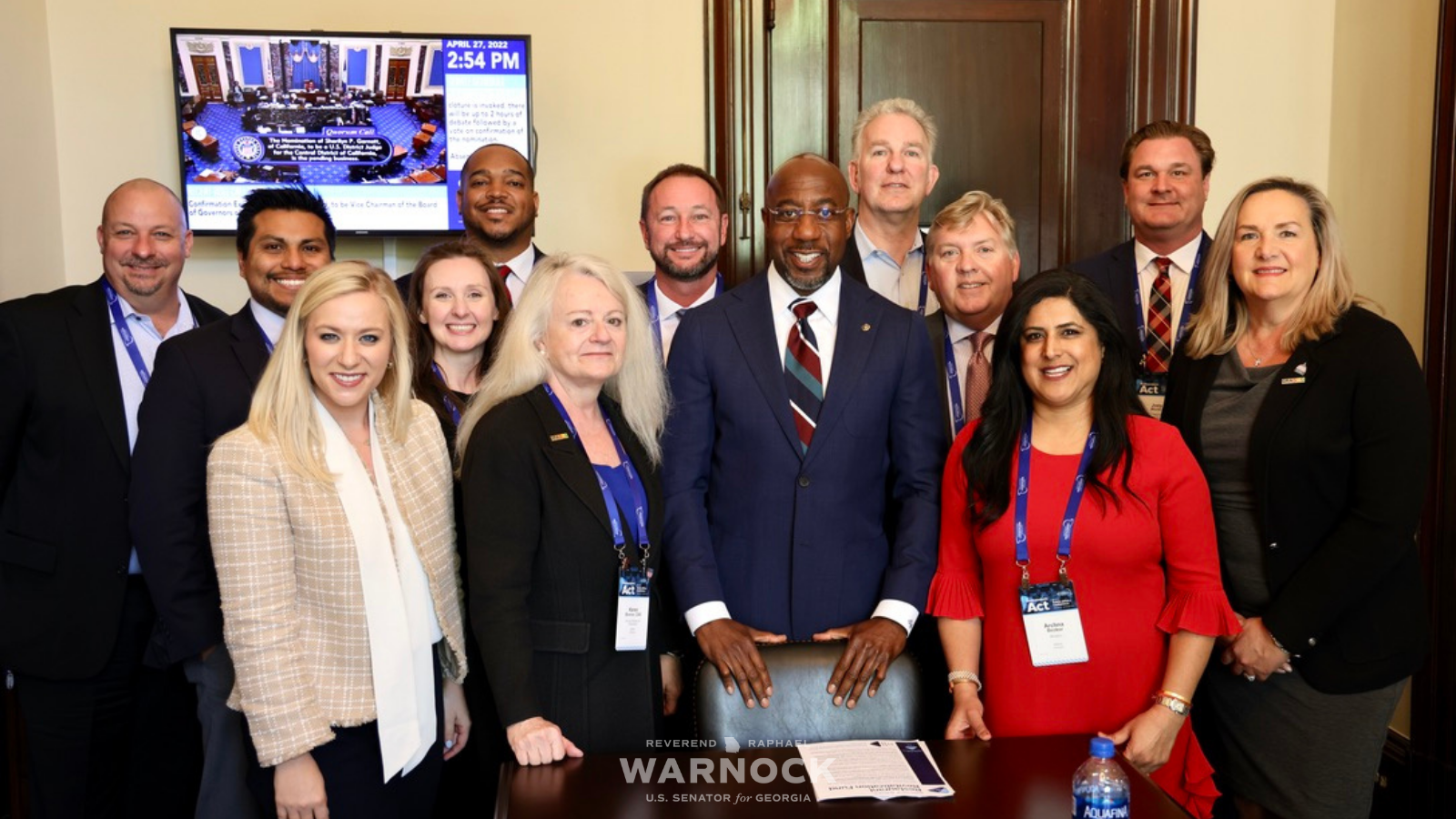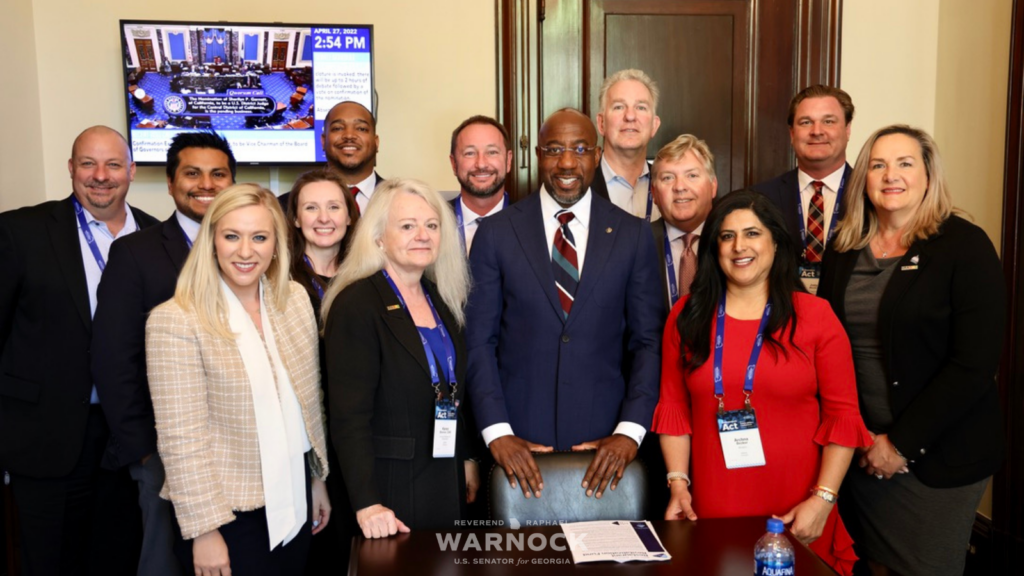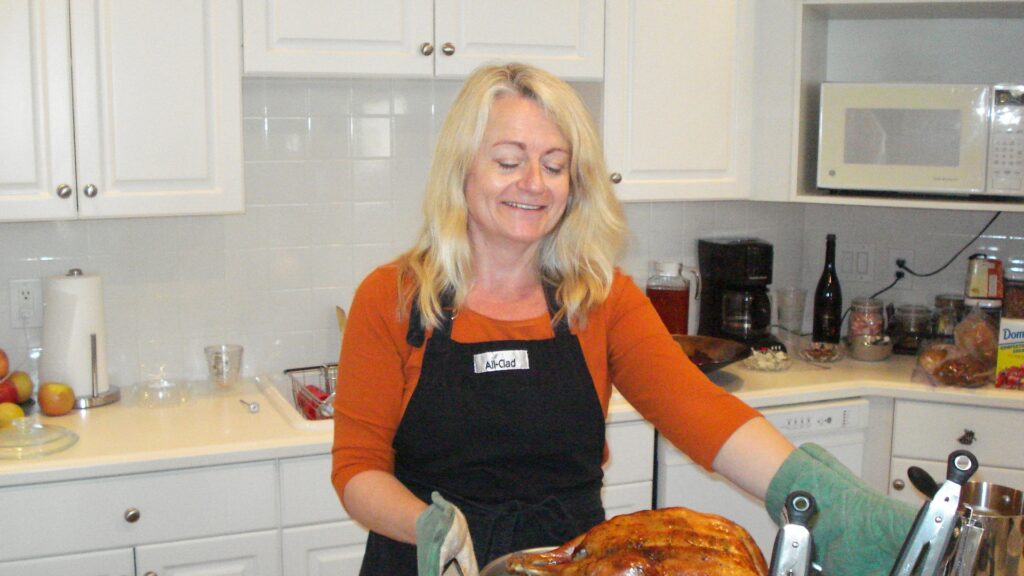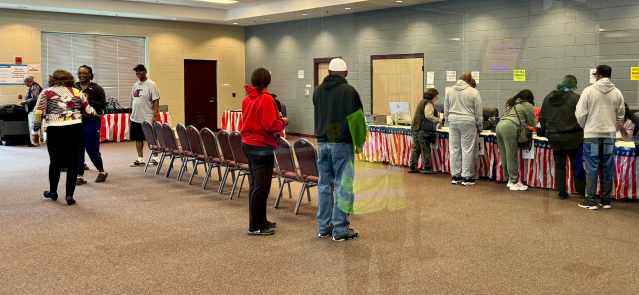Stay ahead of the curve as a political insider with deep policy analysis, daily briefings and policy-shaping tools.
Request a DemoRestaurant association digs in on Statehouse lobbying efforts and walks away successful

Karen Bremer, Georgia Restaurant Association board members and staff visiting Sen. Warnock in his office in Washington DC to discuss issues affecting the restaurant industry in Georgia on a Federal Level. (Credit: Karen Bremer)
It all started with a half-eaten order of french fries.
In late 2019, Georgia Restaurant Association President and CEO Karen Bremer heard about a disturbing incident. An Atlanta City councilman had received a batch of tampered fries in his food-delivery order and was having subsequent problems with other online food orders.
The case was just the tip of a much wider problem, Bremer would soon learn, just as COVID was emerging, restaurants were closing, and people were confined to their homes and relying on third-party food delivery companies such as DoorDash and Uber Eats.

What transpired would lead to the first steps in Georgia regulating the nation’s $26 billion online food-delivery business.
“Senator Parent reached out to me and said, ‘I’m getting all these complaints from the restaurants in my district about these third-party delivery companies’,” the veteran restaurant industry lobbyist Bremer recalled about her interaction with state Sen. Elena Parent, D-Atlanta, in April 2020.
Problems ran the gamut: Many restaurants were unaware online delivery services were using their logos and likeness on their websites. In addition to eating customers’ food, there were concerns over drivers having kids or pets children tagging along on deliveries. Third-party food delivery apps were operating essentially unchecked. There were no federal laws monitoring them.
After more than two years of lobbying, study committees, hearings, presentations, and legislative wrangling, third-party food delivery apps will soon be under regulatory scrutiny.
Third-party delivery services will no longer be able to take orders for, pick up from or deliver food from a restaurant without that restaurant’s prior written consent. The delivery services also won’t be able to use a restaurant’s name, likeness or logo in a way that implies endorsement by the restaurant without written permission. The law takes effect Jan. 1. Indiana recently passed a similar law. Similar legislation is pending in 10 other states, Bremer said.
The Georgia Restaurant Association (GRA) was instrumental in getting the Georgia law passed. Not bad for a lobbying group that 13 years ago, Bremer said “virtually had no presence at the state capitol.”
GRA represents over 9,000 restaurants throughout the state. As the restaurant industry’s lobbying organization, its chief job is to make lawmakers aware of the concerns of Georgia’s 21,000 restaurants, most of whom are independently owned.
Bremer, who started in the restaurant industry at the age of 15, talked with State Affairs about other ways GRA flexes its lobbying muscle, and how the pandemic forced restaurant owners to “get smarter.”
The conversation has been edited for clarity and length.
Q. What led you to a career in the restaurant industry?
A. I’ve always loved to entertain. People asked me what it was like running a restaurant and I would say, ‘I got to throw a dinner party every night and got paid for it.’
But when I was [working] with W.R. Grace in the mid-to-late 70’s, and opening all these restaurants, I really fell in love with taking a group of 60 to 100 people, creating a team and then creating guest satisfaction and employee satisfaction. I’m a detail-conscious person. So it was all the details that created that experience for you. That’s truly what made me continue [in this business] as a career.
Q. What’s the best career lesson or advice you’ve ever received?
A. Never be afraid to ask why you are doing something.
Q. How would you characterize the Georgia Restaurant Association?
A. We are an advocacy and education organization. We are also responsible for making sure that there is awareness of the importance of the restaurant industry.
Q. Is it fair to say you’re a lobbying organization as well?
A. Yes.

Q. What is GRA’s mission and how has that changed over the years?
A. The mission is to serve as the voice for Georgia’s restaurants through advocacy, education and awareness. Restaurateurs want to hire everybody, regardless of their ethnic background, skin color, orientation or religion, and restaurateurs want to feed everybody. So, it’s very hard for a restaurateur to take a public position that might be opposed by some people and lauded by others.
So our organization speaks for those restaurateurs who don’t want to alienate their employees or their customers. Restaurateurs are fiscally conservative but to a great degree … I don’t like using the term socially liberal. It’s a very humanistic industry.
Anybody can hire a chef, open a great location and purchase great food, but if you don’t have the right people in the right places doing the jobs, then you’re not going to achieve customer satisfaction.
Q. Many lobbying groups have tons of money to court lawmakers; other groups rely more on grassroots efforts, getting out into the community to push their agendas. How does GRA go about its lobbying efforts?
A. In terms of what we spend money on, we throw a huge event every February for the entire legislature. It’s called The Taste of Georgia. There’s restaurants from around the state that focus on Georgia-grown food. Legislators understand that they have restaurants in their community that are an important part of their community. In my opinion, the legislators that care about their communities want information from me. They want to understand the economics of what is going on with that industry in their communities.
In fact, on the House side, the chairman of the Labor Committee at the start of the two-year session has me do a presentation on the restaurant industry. I bring some restaurateurs and we do an orientation for the legislators because not everybody has run a business.
Q. Georgia lawmakers are in session 40 days of the year. What’s GRA’s strategy to reach out to lawmakers when they’re not in session?
A. We do visits around the state. We do something that we call a “kitchen cabinet.” It’s restaurateurs meeting with state representatives or local elected officials, mayors, county commissions. They do a couple-hour sessions in one of the restaurants in the afternoon and they tell them what’s going on in the industry and how things are affecting them. We also do that with our federally-elected officials also. We meet our congressmen in their districts.
Q. How did the pandemic change the landscape for restaurants and lobbyists in your industry?
A. What changed was the adoption of technology and electronic communication. We had restaurateurs that didn’t even have websites before the pandemic. There were restaurants that still operated with fax machines. We had a fax machine in our office.
A lot of restaurateurs tend to be very independent. However, during COVID, the industry really came together as a community to help each other, to share best practices of how they were making it work for themselves. Everybody had to get smarter.
Q. How many restaurants in Georgia went under due to the pandemic?
A. In 2020, we lost about 4,000 restaurants. So we ended up with about 19,000 restaurants statewide. However, since 2020, we have gradually been increasing restaurants and now there’s roughly 21,000 statewide.
Q. What was GRA’s role in getting the third-party delivery service bill passed into law?
A. I had started meeting with Senator Parent. We put together data and information to explain the way the system worked. We created a white paper for her. A bipartisan study committee was formed and the legislation we worked on came through. The bill was dropped in the early days of the 2023 [legislative] session.
We were getting all sorts of concerns and complaints from restaurants around the state. We started putting the case together that there needed to be some guardrails put in place.

Q. Any other parts of that law that people can expect to come due in January?
A. We’re going to be back in January trying to get some public health and safety rules passed. Hot food should be kept hot. Cold food should be kept cold. There shouldn’t be pets [in delivery vehicles]. … And it’s incumbent upon my organization that represents restaurants to make sure that the industry is protected.

The Karen Bremer Files
Title: President and CEO of the Georgia Restaurant Association
Age: 64
Birthplace: Montreal, Canada, to parents who were refugees from Germany after World War II. The family immigrated to the United States when Bremer was 10 years old.
Current residence: Turin, Ga.
Education: Attended Hillsboro College and the University of South Florida, both of which are in Tampa. She majored in mass communications.
Career: 49 years in the restaurant industry, starting as a 15-year-old checker for S&S Cafeteria. From there, she held various jobs, including waitress, bartender and cook. She later became a manager for W.R. Grace, owner of Houlihan’s, Del Taco and Atlanta’s Sandpiper restaurant. Bremer opened 30 restaurants in the southwest while at W.R. Grace. She left Grace and became a top executive at Peasant restaurants, a chain founded and owned by Steve Nygrin, creator of Serenbe. She is the former owner of Dailey’s restaurant in downtown Atlanta and City Grill.
Little-known tidbit: Bremer was a founding member of the Georgia Restaurant Association about 20 years ago as an independent restaurateur.
Hobbies: Gardening, cooking [her specialties are classic French cuisine and “Mediterranean healthy.”]
Family: Married to John Piazza. The couple has a son and a daughter and two granddaughters.
What job would you be doing other than your current one: I’d be teaching young people about the opportunities and pathways the hospitality industry can create for them.
Have questions, comments or tips? Contact Tammy Joyner on Twitter @lvjoyner or at [email protected].
Twitter @StateAffairsGA
Facebook @stateaffairsUS
Instagram @stateaffairsGA
LinkedIn @stateaffairs
A primer on the Nov. 5 ballot measures: What you need to know
In addition to voting for president and down-ballot candidates in the Nov. 5 election, Georgians will decide on a couple of tax measures and whether to create a statewide tax court. Three questions call for a statewide vote, all of which appear at the end of the ballot. The first time most voters see these …
Tuesday’s early voting turnout sets highest 1-day record in a presidential election year
More than 306,000 Georgians voted on the first day of early voting Tuesday, setting the highest one-day early voting turnout in a presidential election year. Tuesday’s statewide turnout of 306,118 voters more than doubled that of first-day early voting for the general election four years ago, state election officials reported just after 8:30 p.m. Tuesday. “It’s …
Georgia Supreme Court restores state’s 6-week abortion ban
The Georgia Supreme Court reinstated the state’s six-week abortion ban Monday, a week after a lower court judge overturned the controversial measure. The court ordered the stay while it considers the state’s appeal of the lower court ruling. The head of an anti-abortion organization praised the Supreme Court’s decision, which went into effect at 5 …
Weekend Read: Georgia abortion clinics see surge after 6-week abortion ban struck down
While Georgia lawmakers seek to restore the state’s six-week abortion ban struck down earlier this week, some abortion clinics are reporting increased activity as women seek help during what some view as a temporary reprieve in the state law. Fulton County Superior Court Judge Robert McBurney on Monday struck down Georgia’s abortion ban, ruling it …




